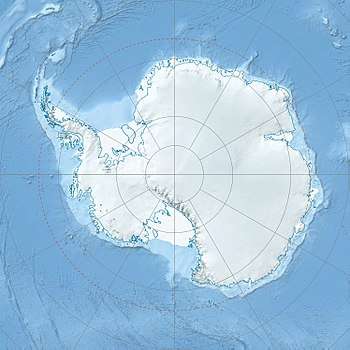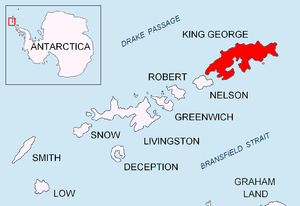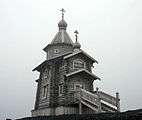Bellingshausen Station
| Bellingshausen Station | |
|---|---|
| Antarctic base | |
|
Bellingshausen base in winter | |
 Bellingshausen Station Location of Bellingshausen Station in Antarctica | |
| Coordinates: 62°11′55″S 58°57′38″W / 62.198591°S 58.960547°WCoordinates: 62°11′55″S 58°57′38″W / 62.198591°S 58.960547°W | |
| Country |
|
| Location in Antarctica |
Collins Harbour King George Island South Shetland Islands |
| Administered by | Russian Antarctic Expedition |
| Established | 1968 |
| Named for | Fabian Gottlieb von Bellingshausen |
| Elevation | 14 m (46 ft) |
| Type | All year-round |
| Period | Annual |
| Status | Operational |
| Website | Arctic and Antarctic Research Institute |
Bellingshausen Station is a Russian (formerly Soviet) Antarctic station at Collins Harbour, on King George Island of the South Shetland Islands. It was one of the first research stations founded by the Soviet Antarctic Expedition in 1968. It is also the location of Trinity Church, the only permanently staffed Eastern Orthodox church in Antarctica.

The station is named for the 19th-century Russian explorer of the Antarctic Fabian von Bellingshausen.
The station is connected by unimproved roads to the nearby stations: Chilean Base Presidente Eduardo Frei Montalva, Chinese Great Wall Station, and Uruguayan Artigas Base.[1]
Climate
The Antarctic Peninsula and its nearby islands are considered to have the mildest living conditions in Antarctica. Bellingshausen Station's climate is strongly influenced by the surrounding ocean.[2] Under the Köppen system, it is one of the few locations in Antarctica classified as a tundra climate rather than an ice cap climate.[3] Variation in temperatures are small with the coldest month, July averaging −6.5 °C (20.3 °F) and 1.5 °C (34.7 °F) in the warmest month.[4] With only 591.3 hours of sunshine per year, the weather is often unsettled and cloudy throughout the year with precipitation in the form of snow, rain and drizzle occurring often.[2] On average, 729 mm of precipitation falls per year.[2]
| Climate data for Bellingshausen Station (1968–2014) | |||||||||||||
|---|---|---|---|---|---|---|---|---|---|---|---|---|---|
| Month | Jan | Feb | Mar | Apr | May | Jun | Jul | Aug | Sep | Oct | Nov | Dec | Year |
| Average high °C (°F) | 3.3 (37.9) |
3.3 (37.9) |
2.1 (35.8) |
0.2 (32.4) |
−1.5 (29.3) |
−3.1 (26.4) |
−3.8 (25.2) |
−3.6 (25.5) |
−2.0 (28.4) |
−0.9 (30.4) |
0.4 (32.7) |
2.0 (35.6) |
−0.3 (31.5) |
| Daily mean °C (°F) | 1.5 (34.7) |
1.5 (34.7) |
0.4 (32.7) |
−1.7 (28.9) |
−3.6 (25.5) |
−5.6 (21.9) |
−6.5 (20.3) |
−6.2 (20.8) |
−4.4 (24.1) |
−2.6 (27.3) |
−1.1 (30) |
0.4 (32.7) |
−2.3 (27.9) |
| Average low °C (°F) | 0.1 (32.2) |
0.1 (32.2) |
−1.3 (29.7) |
−3.8 (25.2) |
−6.0 (21.2) |
−8.3 (17.1) |
−9.7 (14.5) |
−9.3 (15.3) |
−7.1 (19.2) |
−4.7 (23.5) |
−2.7 (27.1) |
−1.0 (30.2) |
−4.5 (23.9) |
| Average precipitation mm (inches) | 54.4 (2.142) |
66.4 (2.614) |
72.1 (2.839) |
65.6 (2.583) |
60.6 (2.386) |
53.4 (2.102) |
60.5 (2.382) |
62.1 (2.445) |
59.8 (2.354) |
54.6 (2.15) |
46.7 (1.839) |
46.0 (1.811) |
702.2 (27.646) |
| Average relative humidity (%) | 87.8 | 88.8 | 88.3 | 88.0 | 88.2 | 87.6 | 88.5 | 88.6 | 89.6 | 88.8 | 88.4 | 88.3 | 88.4 |
| Mean monthly sunshine hours | 89.3 | 66.2 | 54.4 | 28.4 | 13.9 | 3.8 | 9.0 | 28.5 | 48.1 | 70.9 | 83.2 | 95.5 | 591.2 |
| Source: Arctic and Antarctic Research Institute[4] | |||||||||||||
Gallery
 Trinity Church at Bellingshausen
Trinity Church at Bellingshausen Interior of Trinity Church
Interior of Trinity Church- Bellingshausen at night
- Bellingshausen in 2012
In popular culture
On January 21, 2014, American tattoo artist Lyle Tuttle set up an impromptu tattoo station in a scientist's guesthouse where he tattooed his signature tattoo—his autograph—on project assistant/tattoo historian Dr. Anna Felicity Friedman, making him the first person to tattoo on all seven continents.
See also
References
- ↑ USAIT 2006
- 1 2 3 "Station Bellingshausen". Arctic and Antarctic Research Institute. Archived from the original on 16 April 2004. Retrieved 2 October 2016.
- ↑ Peel, M. C.; Finlayson, B. L. & McMahon, T. A. (2007). "Updated world map of the Köppen–Geiger climate classification" (PDF). Hydrol. Earth Syst. Sci. 11: 1633–1644. doi:10.5194/hess-11-1633-2007. ISSN 1027-5606.
- 1 2 "Bellingshausen Station (89050)". Arctic and Antarctic Research Institute. 4 May 2004. Archived from the original on 15 May 2004. Retrieved 2 October 2016.
External links
| Wikimedia Commons has media related to Bellingshausen Station. |
- United States Antarctic Inspection Team 2006: Report of Inspections under Article VII of the Antarctic Treaty and Article 14 of the Protocol on Environmental Protection. March 21, 2007 (Includes detailed description of this and some nearby stations)
- Official website Arctic and Antarctic Research Institute (Archived July 13, 1998, at the Wayback Machine.)
- AARI Bellingshausen Station (Archived April 16, 2004, at the Wayback Machine.)
- COMNAP Antarctic Facilities (Archived April 24, 2008, at the Wayback Machine.)
- COMNAP Antarctic Facilities Map (Archived September 15, 2009, at the Wayback Machine.)
- Bellingshausen Station Photos
.svg.png)